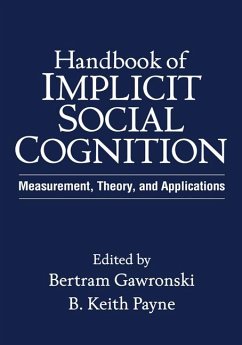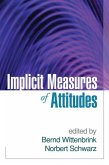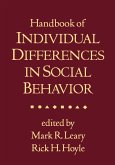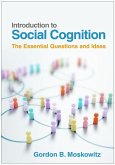Handbook of Implicit Social Cognition
Measurement, Theory, and Applications
Herausgeber: Gawronski, Bertram; Payne, B Keith
Handbook of Implicit Social Cognition
Measurement, Theory, and Applications
Herausgeber: Gawronski, Bertram; Payne, B Keith
- Gebundenes Buch
- Merkliste
- Auf die Merkliste
- Bewerten Bewerten
- Teilen
- Produkt teilen
- Produkterinnerung
- Produkterinnerung
Virtually every question in social psychology is currently being shaped by the concepts and methods of implicit social cognition. This tightly edited volume provides the first comprehensive overview of the field. Foremost authorities synthesize the latest findings on how automatic, implicit, and unconscious cognitive processes influence social judgments and behavior. Cutting-edge theories and data are presented in such crucial areas as attitudes, prejudice and stereotyping, self-esteem, self-concepts, close relationships, and morality. Describing state-of-the-art measurement procedures and…mehr
Andere Kunden interessierten sich auch für
![Implicit Measures of Attitudes Implicit Measures of Attitudes]() Implicit Measures of Attitudes48,99 €
Implicit Measures of Attitudes48,99 €![Socionomic Causality in Politics Socionomic Causality in Politics]() Robert R PrechterSocionomic Causality in Politics35,99 €
Robert R PrechterSocionomic Causality in Politics35,99 €![Handbook of Individual Differences in Social Behavior Handbook of Individual Differences in Social Behavior]() Handbook of Individual Differences in Social Behavior120,99 €
Handbook of Individual Differences in Social Behavior120,99 €![Introduction to Social Cognition Introduction to Social Cognition]() Gordon B MoskowitzIntroduction to Social Cognition110,99 €
Gordon B MoskowitzIntroduction to Social Cognition110,99 €![Theory and Explanation in Social Psychology Theory and Explanation in Social Psychology]() Theory and Explanation in Social Psychology76,99 €
Theory and Explanation in Social Psychology76,99 €![Handbook of Self-Regulation Handbook of Self-Regulation]() Handbook of Self-Regulation92,99 €
Handbook of Self-Regulation92,99 €![Unintended Thought Unintended Thought]() Unintended Thought67,99 €
Unintended Thought67,99 €-
-
-
Virtually every question in social psychology is currently being shaped by the concepts and methods of implicit social cognition. This tightly edited volume provides the first comprehensive overview of the field. Foremost authorities synthesize the latest findings on how automatic, implicit, and unconscious cognitive processes influence social judgments and behavior. Cutting-edge theories and data are presented in such crucial areas as attitudes, prejudice and stereotyping, self-esteem, self-concepts, close relationships, and morality. Describing state-of-the-art measurement procedures and research designs, the book discusses promising applications in clinical, forensic, and other real-world contexts. Each chapter both sums up what is known and identifies key directions for future research.
Produktdetails
- Produktdetails
- Verlag: Guilford Publications
- Seitenzahl: 594
- Erscheinungstermin: 10. Juni 2010
- Englisch
- Abmessung: 261mm x 185mm x 35mm
- Gewicht: 1226g
- ISBN-13: 9781606236734
- ISBN-10: 1606236733
- Artikelnr.: 28895131
- Herstellerkennzeichnung
- Libri GmbH
- Europaallee 1
- 36244 Bad Hersfeld
- gpsr@libri.de
- Verlag: Guilford Publications
- Seitenzahl: 594
- Erscheinungstermin: 10. Juni 2010
- Englisch
- Abmessung: 261mm x 185mm x 35mm
- Gewicht: 1226g
- ISBN-13: 9781606236734
- ISBN-10: 1606236733
- Artikelnr.: 28895131
- Herstellerkennzeichnung
- Libri GmbH
- Europaallee 1
- 36244 Bad Hersfeld
- gpsr@libri.de
Bertram Gawronski, PhD, is Professor of Psychology at the University of Texas at Austin. His research investigates the mental underpinnings and behavioral consequences of spontaneous and deliberate evaluations of objects, individuals, groups, and social issues. Dr. Gawronski's work has been recognized with honors including the Theoretical Innovation Prize from SPSP, the Career Trajectory Award from SESP, the Early Career Award from the International Social Cognition Network, the Early Researcher Award from the Ministry of Research and Innovation of Ontario, and the Charlotte-and-Karl-Bÿhler Award from the German Psychological Society. He is a fellow of APS, SESP, and SPSP. B. Keith Payne, PhD, is Associate Professor in the Department of Psychology at the University of North Carolina at Chapel Hill. His research is concerned with the development of innovative approaches for studying automatic and controlled processes underpinning social behavior. Dr. Payne is a recipient of the Early Career Award from the International Social Cognition Network and the SAGE Young Scholars Award from the Foundation for Social and Personality Psychology and Sage Publications. He was profiled as a âEURRising StarâEUR in psychology in the Association for Psychological Science Observerand was cited by the Observer as one of the Top Ten most highly cited Social/Personality Psychologists at the Assistant Professor rank in the United States.  Â
1. A History of Implicit Social Cognition: Where Is It Coming From? Where Is It Now? Where Is It Going?
B. Keith Payne and BertramGawronskiI. Basics 2. In Search of a Measure That Qualifies as Implicit: Recommendations Based on a Decompositional View of Automaticity
Agnes Moors
Adriaan Spruyt
and Jan De Houwer 3. Models of Implicit and Explicit Mental Representation
Don Carlston 4. Building Blocks of Social Behavior: Reflective and Impulsive Processes
Roland Deutsch and Fritz Strack 5. Implicit Social Cognition: Insights from Social Neuroscience
Tiffany A. ItoII. Methods and Procedures 6. A Practical Guide to Sequential Priming and Related Tasks
Dirk Wentura and Juliane Degner 7. A Practical Guide to Implicit Association Tests and Related Tasks
Sara Teige-Mocigemba
Karl Christoph Klauer
and Jeffrey W. Sherman 8. A Practical Guide to Paper-and-Pencil Implicit Measures of Attitudes
Denise Sekaquaptewa
Patrick Vargas
and William von Hippel 9. Mathematical Modeling of Implicit Social Cognition: The Machine in the Ghost
Jeffrey W. Sherman
Karl Christoph Klauer
and Thomas J. Allen 10. Implicit Measures: Similarities and Differences
Jan De Houwer and Agnes MoorsIII. Cross-Cutting Perspectives 11. Consciousness
Introspection
and the Adaptive Unconscious
Wilhelm Hofmann and Timothy D. Wilson 12. Formation
Change
and Contextualization of Mental Associations: Determinants and Principles of Variations in Implicit Measures
Bertram Gawronski and Rajees Sritharan 13. The Development of Implicit Social Cognition
Kristina R. Olson and Yarrow Dunham 14. Prediction of Behavior
Marco Perugini
Juliette Richetin
and Cristina Zogmaister 15. Automatic Aspects of Judgment and Decision Making
Galen V. Bodenhausen and Andrew R. Todd 16. Consistency and Inconsistency in Implicit Social Cognition: The Case of Implicit and Explicit Measures of Attitudes
Robert J. Rydell and Allen R. McConnell 17. What is Implicit about Goal Pursuit?
Melissa J. Ferguson and Shanette C. PorterIV. Domain-Specific Perspectives 18. Attitude Structure and Change: Implications for Implicit Measures
Richard E. Petty and Pablo Briñol 19. Implicit Intergroup Bias: Cognitive
Affective
and Motivational Underpinnings
David M. Amodio and Saaid A. Mendoza 20. Racial Bias and Stereotyping: Interpersonal Processes
Sophie Trawalter and Jenessa R. Shapiro 21. Two Faces of Self-Esteem: Implicit and Explicit Forms of Self-Esteem
Virgil Zeigler-Hill and Christian H. Jordan 22. The Self-Concept: New Insights from Implicit Measurement Procedures
Konrad Schnabel and Jens B. Asendorpf 23. Measuring Implicit Processes in Close Relationships
Mark W. Baldwin
John E. Lydon
M. Joy McClure
and Sara Etchison <
B. Keith Payne and BertramGawronskiI. Basics 2. In Search of a Measure That Qualifies as Implicit: Recommendations Based on a Decompositional View of Automaticity
Agnes Moors
Adriaan Spruyt
and Jan De Houwer 3. Models of Implicit and Explicit Mental Representation
Don Carlston 4. Building Blocks of Social Behavior: Reflective and Impulsive Processes
Roland Deutsch and Fritz Strack 5. Implicit Social Cognition: Insights from Social Neuroscience
Tiffany A. ItoII. Methods and Procedures 6. A Practical Guide to Sequential Priming and Related Tasks
Dirk Wentura and Juliane Degner 7. A Practical Guide to Implicit Association Tests and Related Tasks
Sara Teige-Mocigemba
Karl Christoph Klauer
and Jeffrey W. Sherman 8. A Practical Guide to Paper-and-Pencil Implicit Measures of Attitudes
Denise Sekaquaptewa
Patrick Vargas
and William von Hippel 9. Mathematical Modeling of Implicit Social Cognition: The Machine in the Ghost
Jeffrey W. Sherman
Karl Christoph Klauer
and Thomas J. Allen 10. Implicit Measures: Similarities and Differences
Jan De Houwer and Agnes MoorsIII. Cross-Cutting Perspectives 11. Consciousness
Introspection
and the Adaptive Unconscious
Wilhelm Hofmann and Timothy D. Wilson 12. Formation
Change
and Contextualization of Mental Associations: Determinants and Principles of Variations in Implicit Measures
Bertram Gawronski and Rajees Sritharan 13. The Development of Implicit Social Cognition
Kristina R. Olson and Yarrow Dunham 14. Prediction of Behavior
Marco Perugini
Juliette Richetin
and Cristina Zogmaister 15. Automatic Aspects of Judgment and Decision Making
Galen V. Bodenhausen and Andrew R. Todd 16. Consistency and Inconsistency in Implicit Social Cognition: The Case of Implicit and Explicit Measures of Attitudes
Robert J. Rydell and Allen R. McConnell 17. What is Implicit about Goal Pursuit?
Melissa J. Ferguson and Shanette C. PorterIV. Domain-Specific Perspectives 18. Attitude Structure and Change: Implications for Implicit Measures
Richard E. Petty and Pablo Briñol 19. Implicit Intergroup Bias: Cognitive
Affective
and Motivational Underpinnings
David M. Amodio and Saaid A. Mendoza 20. Racial Bias and Stereotyping: Interpersonal Processes
Sophie Trawalter and Jenessa R. Shapiro 21. Two Faces of Self-Esteem: Implicit and Explicit Forms of Self-Esteem
Virgil Zeigler-Hill and Christian H. Jordan 22. The Self-Concept: New Insights from Implicit Measurement Procedures
Konrad Schnabel and Jens B. Asendorpf 23. Measuring Implicit Processes in Close Relationships
Mark W. Baldwin
John E. Lydon
M. Joy McClure
and Sara Etchison <
1. A History of Implicit Social Cognition: Where Is It Coming From? Where Is It Now? Where Is It Going?
B. Keith Payne and BertramGawronskiI. Basics 2. In Search of a Measure That Qualifies as Implicit: Recommendations Based on a Decompositional View of Automaticity
Agnes Moors
Adriaan Spruyt
and Jan De Houwer 3. Models of Implicit and Explicit Mental Representation
Don Carlston 4. Building Blocks of Social Behavior: Reflective and Impulsive Processes
Roland Deutsch and Fritz Strack 5. Implicit Social Cognition: Insights from Social Neuroscience
Tiffany A. ItoII. Methods and Procedures 6. A Practical Guide to Sequential Priming and Related Tasks
Dirk Wentura and Juliane Degner 7. A Practical Guide to Implicit Association Tests and Related Tasks
Sara Teige-Mocigemba
Karl Christoph Klauer
and Jeffrey W. Sherman 8. A Practical Guide to Paper-and-Pencil Implicit Measures of Attitudes
Denise Sekaquaptewa
Patrick Vargas
and William von Hippel 9. Mathematical Modeling of Implicit Social Cognition: The Machine in the Ghost
Jeffrey W. Sherman
Karl Christoph Klauer
and Thomas J. Allen 10. Implicit Measures: Similarities and Differences
Jan De Houwer and Agnes MoorsIII. Cross-Cutting Perspectives 11. Consciousness
Introspection
and the Adaptive Unconscious
Wilhelm Hofmann and Timothy D. Wilson 12. Formation
Change
and Contextualization of Mental Associations: Determinants and Principles of Variations in Implicit Measures
Bertram Gawronski and Rajees Sritharan 13. The Development of Implicit Social Cognition
Kristina R. Olson and Yarrow Dunham 14. Prediction of Behavior
Marco Perugini
Juliette Richetin
and Cristina Zogmaister 15. Automatic Aspects of Judgment and Decision Making
Galen V. Bodenhausen and Andrew R. Todd 16. Consistency and Inconsistency in Implicit Social Cognition: The Case of Implicit and Explicit Measures of Attitudes
Robert J. Rydell and Allen R. McConnell 17. What is Implicit about Goal Pursuit?
Melissa J. Ferguson and Shanette C. PorterIV. Domain-Specific Perspectives 18. Attitude Structure and Change: Implications for Implicit Measures
Richard E. Petty and Pablo Briñol 19. Implicit Intergroup Bias: Cognitive
Affective
and Motivational Underpinnings
David M. Amodio and Saaid A. Mendoza 20. Racial Bias and Stereotyping: Interpersonal Processes
Sophie Trawalter and Jenessa R. Shapiro 21. Two Faces of Self-Esteem: Implicit and Explicit Forms of Self-Esteem
Virgil Zeigler-Hill and Christian H. Jordan 22. The Self-Concept: New Insights from Implicit Measurement Procedures
Konrad Schnabel and Jens B. Asendorpf 23. Measuring Implicit Processes in Close Relationships
Mark W. Baldwin
John E. Lydon
M. Joy McClure
and Sara Etchison <
B. Keith Payne and BertramGawronskiI. Basics 2. In Search of a Measure That Qualifies as Implicit: Recommendations Based on a Decompositional View of Automaticity
Agnes Moors
Adriaan Spruyt
and Jan De Houwer 3. Models of Implicit and Explicit Mental Representation
Don Carlston 4. Building Blocks of Social Behavior: Reflective and Impulsive Processes
Roland Deutsch and Fritz Strack 5. Implicit Social Cognition: Insights from Social Neuroscience
Tiffany A. ItoII. Methods and Procedures 6. A Practical Guide to Sequential Priming and Related Tasks
Dirk Wentura and Juliane Degner 7. A Practical Guide to Implicit Association Tests and Related Tasks
Sara Teige-Mocigemba
Karl Christoph Klauer
and Jeffrey W. Sherman 8. A Practical Guide to Paper-and-Pencil Implicit Measures of Attitudes
Denise Sekaquaptewa
Patrick Vargas
and William von Hippel 9. Mathematical Modeling of Implicit Social Cognition: The Machine in the Ghost
Jeffrey W. Sherman
Karl Christoph Klauer
and Thomas J. Allen 10. Implicit Measures: Similarities and Differences
Jan De Houwer and Agnes MoorsIII. Cross-Cutting Perspectives 11. Consciousness
Introspection
and the Adaptive Unconscious
Wilhelm Hofmann and Timothy D. Wilson 12. Formation
Change
and Contextualization of Mental Associations: Determinants and Principles of Variations in Implicit Measures
Bertram Gawronski and Rajees Sritharan 13. The Development of Implicit Social Cognition
Kristina R. Olson and Yarrow Dunham 14. Prediction of Behavior
Marco Perugini
Juliette Richetin
and Cristina Zogmaister 15. Automatic Aspects of Judgment and Decision Making
Galen V. Bodenhausen and Andrew R. Todd 16. Consistency and Inconsistency in Implicit Social Cognition: The Case of Implicit and Explicit Measures of Attitudes
Robert J. Rydell and Allen R. McConnell 17. What is Implicit about Goal Pursuit?
Melissa J. Ferguson and Shanette C. PorterIV. Domain-Specific Perspectives 18. Attitude Structure and Change: Implications for Implicit Measures
Richard E. Petty and Pablo Briñol 19. Implicit Intergroup Bias: Cognitive
Affective
and Motivational Underpinnings
David M. Amodio and Saaid A. Mendoza 20. Racial Bias and Stereotyping: Interpersonal Processes
Sophie Trawalter and Jenessa R. Shapiro 21. Two Faces of Self-Esteem: Implicit and Explicit Forms of Self-Esteem
Virgil Zeigler-Hill and Christian H. Jordan 22. The Self-Concept: New Insights from Implicit Measurement Procedures
Konrad Schnabel and Jens B. Asendorpf 23. Measuring Implicit Processes in Close Relationships
Mark W. Baldwin
John E. Lydon
M. Joy McClure
and Sara Etchison <








